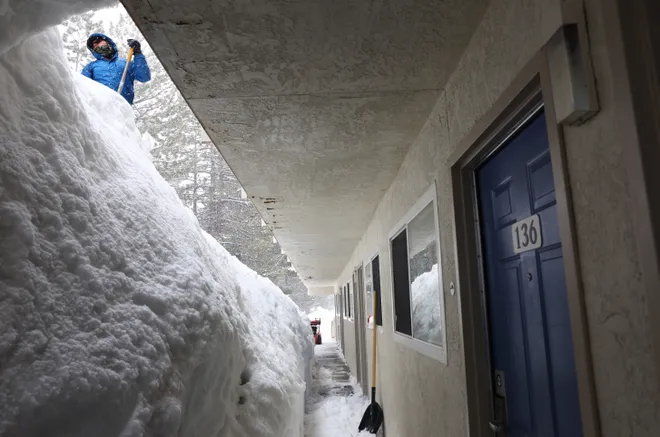Atmospheric river to dump rain, snow on millions; Portland could get month's worth of rain
Forecasters say storms will drop rain, snow, and then more rain on millions in the western U.S. in coming days, bringing a slushy start to December.
When the wet season comes to the Pacific Northwest, AccuWeather meteorologist Kevin Coskren said, "sometimes it just doesn't go away," he said, referring to days of rain forecast in Seattle in the next week.
Seattle, Tacoma and Olympia, Washington, will be under flood watches starting Sunday morning, as the region braced for heavy rain and snow, damaging wind gusts and extensive river flooding, the National Weather Service said.
The East Coast will also have a wet weekend, the National Weather Service said Saturday, with around 10 states, from Maryland to Maine, expected to get rain. Residents along the Gulf Coast were also bracing for severe thunderstorms this week, which could bring up to four inches of rain.
On Saturday morning, storms had already knocked out power in portions of Seattle, the National Weather Service said on X, formerly Twitter.
Winter storm warnings were issued around Salt Lake City Saturday morning, ahead of expected widespread snowstorms Saturday afternoon and Sunday morning.
In Colorado, Idaho, Utah and Wyoming, up to three feet of snow could fall in some areas in the coming days, causing serious transportation disruptions, the National Weather Service said Saturday.
What is an atmospheric river?They bring near-constant rain to the western U.S.
Atmospheric river brings rain, snow
This week's intense rainfall in the West is the result of an atmospheric river, a flow of moisture from the Pacific Ocean that delivers near constant rain to the U.S.'s western coast.
Made visible by clouds, ribbons of water vapor extend thousands of miles from the tropics to California, Oregon and Washington. At 250 to 375 miles wide, they provide the fuel for massive rain and snowstorms.
In general, atmospheric rivers pick up water vapor from the warm, moist air of tropical regions and then drop the water over land in cooler regions as rain or snow.

Month's worth of rain in Pacific northwest
By the middle of next week, Portland could get nearly six inches of rain, representing the city's typical totals for the month of December, according to AccuWeather. The National Weather Service predicts as many as 10 inches of rain could drop on the Oregon coast in the coming days.
"These are going to be some soakers," Coskren said, describing the atmospheric river as "open for business."
Runoff from snowmelt combined with heavy rain on Sunday and Monday will add to flood risks, the National Weather Service in Portland said, with low-lying areas and urban areas with poor drainage being particularly at risk of pooling water.
Heavy winds could reach 40 mph in Portland, the National Weather Service said Friday, reducing visibility for motorists.
Snow could make travel impossible in the Rockies
Residents in the western U.S. were bracing for a second round of snow Saturday, after snow storms swept through the region Friday, reducing visibility on the roads, the National Weather Service in Boise said.
Mt. Saint Helens, Washington, already received nine inches of snow by Friday, and towns in Oregon, including Hood River, weren't far behind — with snowfall totaling six inches ahead of the weekend, AccuWeather reported.
Portions of the Rocky Mountains could receive as much as three feet of snow through Sunday, "likely causing hazardous to even impossible travel conditions," the National Weather Service said Saturday.
"Life-threatening travel conditions," will take shape across large swaths of Washington, Oregon and Idaho due to heavy snowfall, Coskren said.
Wet, wintry weather in the northeast
On Sunday, the I-95 corridor could get soaked with rain and farther north in New England, rain will turn to snow Sunday night, the National Weather Service forecasts.
The heaviest snow is expected in portions of New Hampshire, Vermont and Maine, with more than six inches likely on Sunday, the weather service said Saturday.
Beep:She got a ticket for beeping her car horn. Now she's asking the Supreme Court to sound off.
Gulf Coast thunderstorms
A low-pressure system combining with moisture from the Gulf of Mexico is expected to ignite thunderstorms from Louisiana to the Florida Panhandle over the next few days, according to the National Weather Service, bringing 1-4 inches of rain in some areas.
Damaging wind gusts and tornadoes are possible, the weather service says.
Contributing: Doyle Rice, USA TODAY

Disclaimer: The copyright of this article belongs to the original author. Reposting this article is solely for the purpose of information dissemination and does not constitute any investment advice. If there is any infringement, please contact us immediately. We will make corrections or deletions as necessary. Thank you.




